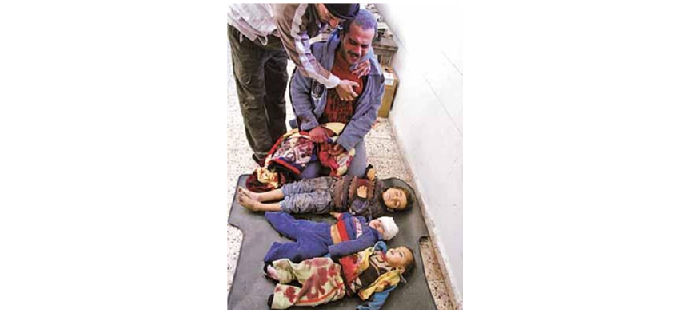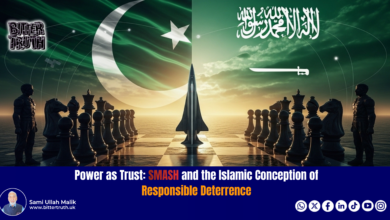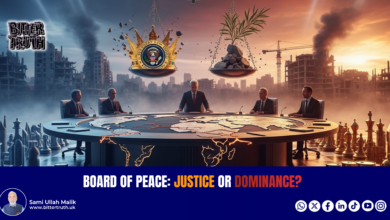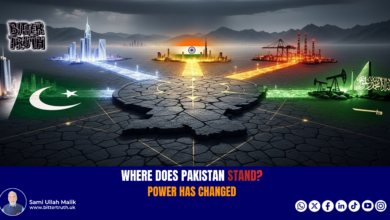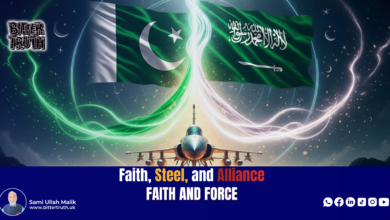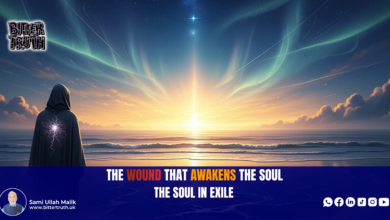Life in this world is contingent upon death
Today, I have summoned the courage to raise my pen in contemplation of the afterlife, mentioning the certainty of death, in the hope that we all may derive some guidance from this unalterable reality. Perhaps, a person of sincere heart should seek advice from it, and provisions for the hereafter should be made in the form of faith, belief, adherence to the Quran, and following the command of the Prophet of the end times. May Allah and His Messenger be pleased, and with Allah’s grace, may the end be in goodness. May salvation be achieved through true belief in the grave and the Day of Judgment. We all know that the struggle between life and death has been ongoing since the beginning. Life claimed that it would persist in this world forever, but death proved it wrong by demonstrating its inevitability.
In life, humans-built houses, established factories, set up shops, planted gardens, constructed air-conditioned mansions, built stores, and created shelters to survive atomic attacks. They adorned and beautified their surroundings, showing off construction, decoration, and grandeur. They built forts, set up defensive barriers, and planted protective forests. However, when death arrived, it laid waste to everything, turned it to ashes, and proclaimed its supremacy.
Despite claiming to be a devout worshiper of the Almighty, one who utters true faith in the real Lord, the procrastination proved fatal. The residents departed, leaving behind their creations. Customers arrived, but the shopkeeper was no more. There was a wife, but now she is a widow. There were children, but now they are orphans. Laughter turned into weeping. Happiness transformed into sorrow. The once thriving population now vanished. The once lively and vibrant home now lies in ruins. Oh, how distressing the scene is! A newborn is crying, but the one who used to plan for feeding, the loving mother, has departed from this world.
The struggle continued day and night between life and death,
In the end, death triumphed, and life suffered defeat.
Hazrat Ibn Manbah states that once the Angel of Death was seizing the soul of a very powerful tyrant. The angels asked him, “You have always taken lives; did you ever show mercy to anyone?” He replied, “I was most afraid of the woman who was completely alone in the jungle. As soon as her child was born, I received the command to seize her soul. I was greatly troubled by the solitude of this woman, thinking about what would happen to her child in the jungle where no one else was present.” The angels said, “The child you are taking the soul of is the same tyrant.” The Angel of Death was astonished and said, “Maula, you are pure, and I am merely a servant. Whatever you will, happens. In contrast, milk is flowing, but the one who used to drink it has gone into the depths of the grave.”
Yes, the palaces of kings were strong, fortresses were present, but those are ruins now. Empty they are, but they serve as reminders, ancient artifacts for those who contemplate. The throne is there, but the one who sat on it is nowhere to be seen. Cushions are there, but the one who sat on them is missing. Pillows remained, but those who used them for rest have left. In this transient world, many great people came: the wicked, the dignified, prophets, saints, righteous individuals, rulers, intellectuals, eloquent speakers, poets, brave and valiant warriors, youth, emperors and kings, ministers, exceedingly beautiful individuals, charming and delicate beings, beloved ones with beautiful foreheads, commanders, horsemen, leaders, wealthy ones, virtuous ones, wicked ones, millions and billions of individuals came, healthy individuals came, helpless ones came, but all were guests for a few days. However great their status was, they were brave, warriors, but death spared no one.
In beauty, there was Yusuf (Joseph), in patience, there was Ayyub (Job), in length of life, there was Umar, and in supplication, there was Nuh (Noah). In satisfaction, there was Ibrahim (Abraham), in modesty, there was Maryam (Mary), in trial, there was Hajar, in silence, there was Zakariya, in weeping, there was Yaqub (Jacob), in glory, there was Musa (Moses), in melodious singing, there was Dawood (David), in wealth, there was Qarun, in governance, there was Sulaiman (Solomon), in faith, there was Maryam (Asia), in modesty, there was Fatimah, in loyalty, there was Khadija, in knowledge, there was Aisha Siddiqa, in patience, there was Sumayyah, in truthfulness, there was Abu Bakr, in justice, there was Umar, in generosity, there was Uthman, in courage, there was Ali, in eloquence, there was Saban, in martyrdom, there was Imam Hussain, in generosity, there was Zubeida, in discourse, there was Raffia, in philosophy, there was Ghazali, in interpretation, there was Mahmood Alusi, in wisdom, there was Lokman, in generosity, there was Hatim, in strength, there was Rustam, in arrogance, there was Nimrod and Pharaoh, in travel, there was Ibn Battuta, in conquest, there was Alexander the Great, in bloodshed, there was Changez Khan, Halaku Khan, Bashar al-Assad, Vladimir Putin, Narendra Modi, but Ghalib, in philosophy, there was Ghazali, in interpretation, there was Mahmood Alusi, in wisdom, there was Lokman, in generosity, there was Hatim, in strength, there was Rustam, in arrogance, there was Nimrod and Pharaoh, in travel, there was Ibn Battuta, in conquest, there was Alexander the Great, In bloodshed, there was Genghis Khan, Halaku Khan, George Bush, Tony Blair, Nathan Yahoo, and Modi., but they all became guests of the grave.
Great personalities were there, but they emptied the settlements.
Neither the remaining ones arrived, nor did the ocean or the cupbearer remain.
Umm al-Momineen Hazrat Aisha (RA) says that if the world was established for one person, the Messenger of Allah (PBUH) would have stayed there forever.
In the service of Prophet Solomon (peace be upon him), the Angel of Death appeared in the form of a man and sat in the presence of the Prophet. A minister was also present. The Angel of Death was seen by the minister several times. When the Angel of Death left, the minister asked, “Who was that, O Prophet?” Prophet Solomon replied, “He was Azrael (Angel of Death).” The minister said, “Seeing him repeatedly instils fear. Grant the wind the command to bring me to my homeland, the island of Bumas”. Prophet Solomon issued the order, and in an instant, the minister reached his homeland.
In another encounter, when Prophet Solomon received the command, the Angel of Death replied, “I was astonished to receive the order to take the life of this minister and bring his soul to the island of Bumas. Your command was fulfilled as soon as I arrived at your doorstep.”
The prince of Harun al-Rashid, though born in the royal palaces, chose a life of extreme simplicity, devoid of wealth and luxury. He wandered in deserts and wilderness. The king sent messengers several times, inviting his son back, offering wealth, treasures, luxury, comfort, palaces, servants, and everything on his every whim. The son replied, “Father, all of these are futile, temporary, and worldly. In the face of the Hereafter, they are worthless. The world is like Qarun’s wealth, and the true inheritance is that of Prophet Muhammad (peace be upon him).”
My attention is on this verse of the Quran: The belongings of this world are very limited. The Hereafter is good and everlasting.”
One day, the time of the prince’s death approached. In a desert abode, in the simplicity of poverty, before surrendering his soul to the Divine, he wrote verses on the ground, and then fell into eternal silence. The verses he penned were:
“O friend, do not be arrogant about wealth,
this wealth will also come to an end, as will life.
When the funeral procession heads towards the graveyard,
Be certain that after it, your turn will also come.
“Harun al-Rashid received news that your son Arjmand, in the jungle, clad in beggar’s attire, with a dirt-covered face, neither wearing sandals nor a crown, that delicate darling with a beautiful body, a garden of grace, without a homeland, without a shroud, peacefully sleeps, free from the world in a perpetual slumber. When the king heard this, paternal love and compassion surged within him. Uncontrollably, cries emerged, and involuntarily, he fell to the ground. Immediately, he reached the side of his beloved son. Kissing his forehead, he said, ‘Congratulations, my son! Today, you have preferred poverty over wealth. Indeed, now you have departed to the lap of the Messenger of Allah ﷺ. Life may be simple, death sublime, but the stain of your separation will forever linger in my heart. Certainly, your helplessness plays the finest role in the path of Allah.
Harun al-Rashid, deeply moved, could not remain without being affected. It became evident that the world is transient, and the Hereafter is everlasting. Afterward, he chose the company and love of scholars. It is also famous about Harun al-Rashid that he would often weep upon hearing advice.
Once, while going for Hajj, he encountered Sadoun Majnun on the way. He recited a few verses, the meaning of which was: “Assume that you have become the king of the entire world, but won’t death come eventually? Leave the world for your enemies. What the world laughs at today, it will make you cry tomorrow.” Upon hearing these verses, Harun al-Rashid let out a cry, fell unconscious, and remained unconscious for such a long time that three prayers were missed.
Imam Hasan Basri, who used to trade in jewels, happened to reach Rome during his travels. He observed that ministers’ wives, maids and servants, and the army were all going somewhere. He asked if there was a celebration today or if they were leaving their homeland. The minister replied, “Come with us.” They reached a jungle where a magnificent tent was set up. First, the armed forces performed a procession, then the scholars and philosophers, followed by the prostitutes, and finally, the ministers. In the end, the king performed the procession, went inside, and emerged with a distressed face, full of grief, sorrow, and tears. Slowly, the king kept saying. Hasan Basri asked what was happening, and the minister said, “The king’s young son has passed away. Every year, the entire army comes with the king to his grave, and this affects them so much that they wonder if this son is in the grip of Allah, who is extremely powerful. The king, weeping, used to say, “O my beloved son! If there were a slight possibility in my power to revive you even a bit, I would have sacrificed all my authority, all my wealth, and the entire kingdom for your sake, just to have one meeting with you. But unfortunately, I have lost miserably. Our power is nothing compared to the control of a being who is free from need.” The impact of this king’s grief and humility on Hasan Basri was so profound that everyone left their businesses and returned to Basra. All the jewels were distributed in the way of Allah among the strangers. Turning away from all the pleasures of the world, they became completely reclusive. For seventy years, they spent their lives in worshiping Allah and serving His creation. Finally, having attained perfection, they departed from this world.
In ancient times, it was a common practice among kings that an advisor would remind them of death every morning and evening. When Shah Jahan’s coronation was taking place, there were melodies, dances, royal processions, beautiful women, and a splendid army present. Treasures were being plundered. People of Allah were engaged in prayers. The poor and beggars were busy with praises and sermons. Poets were writing verses. The administration at the court continued day and night. Adorned with jewels and a magnificent crown, the heroic and pearl-adorned king wore the royal crown. Messages of congratulations and information about the festivities were continuously reaching. In joy and happiness, every person was in a state of bliss.
Suddenly, a beggar spoke aloud, “O king, proclaim the joy as much as you can, for tomorrow this crown will be removed. This royal reign will come to an end. All this luxury and pleasure will vanish. The joy that can give honor can also bring disgrace. The one who gives the crown can also take it away. In the thousands of festivities, the day will come when the crowded and noisy grave will receive you.”
Shah Jahan’s face gradually turned pale. His neck bowed, his eyes teared up, his mind spun, and his existence began to tremble. Immediately, he descended from the throne and placed his head on the ground. With humility and remorse, he cried, “O Master of the earth and the heavens, O true Shah Jahan, O Lord of both worlds, O Merciful and Compassionate, O Inheritor of existence and place, I am the lowest human, Shah Jahan, a drop of impure water, a mere corpse, a needy and poor destitute, a humble servant. O Allah! Save me from disgrace. Your rule is mine; I am under Your control. I am powerless before You, yet noble among humans, poor yet provident, transient yet everlasting. I am not proud, but in need. You alone give honor, serve the nation, and bestow dignity upon the king. Seeing the misery, helplessness, restlessness, and urgency of this king, the entire court was filled with silence. All joy, luxury, and pleasure transformed into thoughts of the Hereafter. Silence prevailed everywhere, all programs were halted, announcements ceased, and only one voice could be heard saying, ‘You are not afraid of the day when your dear ones will come; you will be alone in the grave from that day onward.
Let’s forget death, but death has not forgotten us; it will come, surely come. Complaining about death is wrong; it doesn’t come suddenly. It doesn’t announce its arrival beforehand. We witness children, youth, elderly, and adults dying every day with our own eyes. Everyone knows that the time of death is appointed, but when and where, no one is aware.
According to recent research, the Earth is home to more than 1.9 billion Muslims, and Islam is the fastest-growing religion in the world. In 2010, a total of 57 Muslim-majority countries (including the western shores, Gaza Strip, Mayotte, and Western Sahara) were recognized, and after the inclusion of Nigeria, the count became 58, where Muslims are in power. About 62% of the world’s Muslims live in the Asia-Pacific region (from Turkey to Indonesia), but have we ever thought about our status at this moment? It is worth contemplating.
Today, America has become a superpower by uniting fifty states, while we have 58 Muslim countries. Why aren’t we a “superpower” despite having material strength as well?
It is narrated by Thauban (may Allah be pleased with him) that the Messenger of Allah (peace be upon him) said: “It is near that other nations will fall upon you, just as people fall upon the food plate.” Someone asked, “Will we be less in number?” He (peace be upon him) said, “No, but you will be numerous like the froth, but Allah will remove the fear of you from the hearts of your enemies and will cast “Wahn” into your hearts.” It was asked, “What is “Wahn?” He (peace be upon him) said, “Love of the world and fear of death.” (Sunan Abi Dawood 4297)
Today, some individuals are questioning why Hamas launched an attack on Israel when they are aware that Israel has the backing of powerful forces like the United States and the entire Europe. They argue that Muslims, facing such overwhelming forces, lack the courage to confront them due to their internal discord. However, they forget that for the past decade, the people of Gaza have been under a severe blockade, and Israel, at will, has been closing the doors of life on them, perpetrating oppression, and injustice.
Despite facing the daily reality of death, the people of Gaza have come to understand that by sacrificing their lives, they can once again instill the belief in the world that for them, death in the path of Allah is as precious as life is to you in this transient world.
If Allah helps you, none can overcome you; and if He forsakes you, who is there after Him that can help you? And in Allah (Alone) let believers put their trust. (Qur’an: Al-Imran. 160)
How foolish and ignorant can a person be, that’s not a difficult question. But what makes it challenging is the certainty of death. The dark cloud of death always hovers over one’s head. Wherever you are, whatever you do, one day the grip of death captures you. Who can claim that this belongs to me? But it is death that can rightfully claim it as its trust. There is one way to come, but there are thousands of ways to go. Life in this world is contingent upon death.
Saturday 18 May 2024

